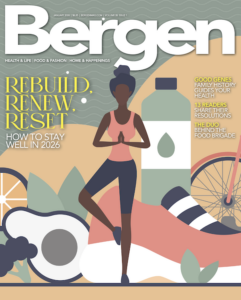Matters Of The Heart
At Bergen's women's health experience event last fall, three local clinicians answered questions about the body's essential muscle. It's news you can use to stay healthy.

Quick: What’s the leading cause of death among women in the United States? You’re forgiven if you answered “breast cancer,” as that disease has earned its high profile as a significant threat to female health. But the answer, according to the Centers for Disease Control and Prevention, is heart disease.
Heart health was the topic of a session at last November’s BERGEN Fall Women’s Health Experience at Edgewood Country Club in River Vale. We opened the floor to questions from the 100+ attendees, and three Bergen-based clinicians gave the responses below. They were Olasumbo Awoniyi, M.D., a family physician from Bergen New Bridge Medical Center; Erica Langford, M.S., R.D.N., from The Valley Hospital; and Lillian Turano, N.P., The Valley Hospital.
What’s the best way to assess one’s risk of developing heart disease?
Turano: We start with baseline blood work and family history. Once we get past the baseline risk, there are lots of other diagnostic testing that can be done. There’s coronary artery CT [computed tomography] scan, which is becoming popular with primary care physicians as a way to detect heart disease. It’s a CT scan of the heart that detects calcium that’s been laid down in the coronary arteries. This is not a diagnostic test, but it’s another risk assessment where we can make an educated guess—if you have a certain amount of calcium in your coronary arteries, then you’re at much higher risk at having a heart attack.
When are heart palpitations a problem? Are they normal at a certain age?
Dr. Awoniyi: Palpitations are when you feel floaters in the chest. There are many causes of palpitations, from heart disease to thyroid disease. If you’re having frequent palpitations, you should see your doctor, who’ll determine if they’re abnormal. Your doctor will do an evaluation, do blood work and an EKG and figure out the cause of the palpitations. They’re not something to sweep under the carpet.
Turano: If you have palpitations and have symptoms such as lightheadedness, fatigue and shortness of breath, definitely don’t wait—get checked out rapidly. Try to keep a mental log. For example, ask yourself if you had an extra cup of coffee today. There are lots of benign palpitations that can be caused by too much caffeine.
Is it a good idea to take baby aspirin if you think you’re having a heart attack?
Dr. Awoniyi: Yes, one of the treatments if you think you’re having a heart attack is to take a higher dose of aspirin such as four pills of baby aspirin. And then call 911.
What are silent heart attacks, and are they more common in men than women?
Turano: It’s a term used for when someone’s had damage to the heart muscle but didn’t feel it. There aren’t any clear warning signs because the patient doesn’t feel anything; nor are there any symptoms. When you go to the doctor and he or she does an EKG, it shows some changes that indicate that there’s been damage to a particular area of your heart. These silent heart attacks are not more prevalent in men than women. But women tend to have heart attacks with more subtle symptoms such as fatigue, things you might not identify as symptoms of a heart attack.
Dr. Awoniyi: Silent heart attacks are more common in people with diabetes.
Do only men get the “widow maker”?
Turano: That’s a term used to describe a blockage in one of the main arteries of the heart that feeds a large portion of the heart muscle. Women can get the widow maker just as much as men can.
What does a history of pre-eclampsia have to do with the heart as you age?
Turano: Pre-eclampsia is the development of high blood pressure during pregnancy, and that can have an effect on the body as you get older. If you had pre-eclampsia, you have higher predisposition for high blood pressure as you age.
Dr. Awoniyi: If you had pre-eclampsia in the past, you can develop hypertension in the future so you have to keep watching your blood pressure. Hypertension is one of the risk factors for cardiovascular disease; it increases the risk of heart attack.
I love dark chocolate. Is that an antioxidant?
Langford: Yes, it absolutely is.
Is there a preferred oil to use for heart-healthy cooking?
Langford: For general sautéing, roasting and baking at home, I’d recommend olive oil. Some oils have a smoke point, the temperature at which they start to get smoky and break down. Most of us are not cooking at home at those temperatures, so there’s nothing wrong with using canola oil or soybean oil. These also contain healthy omega-3s. Some people prefer to use them as well because they’re a bit less expensive than olive oil.
If I use olive oil, which one is best?
Langford: When cooking with olive oil, use what’s labeled as “light-tasting” versus extra virgin. Extravirgin olive oil is cold-pressed and contains all of the antioxidants in the olives. Use it on a salad, drizzled over a caprese salad or as a dressing. You’ll retain the antioxidants in that form because you’re not heating it; antioxidants can be destroyed during cooking. The good fats don’t break down while cooking, and you want to get the antioxidant benefits.

